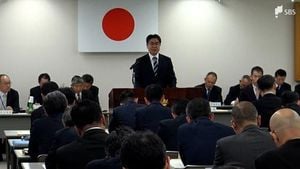In a closely watched election, Hisashi Matsunaga, a former head of the general affairs department, has emerged victorious in the Yanagawa City mayoral race held on April 13, 2025. Matsunaga, who is 60 years old, secured his first term as mayor by garnering 11,931 votes, defeating his opponents Hirotoku Mochiki and Seiji Matsuto.
Mochiki, a 64-year-old former employee of the Ministry of Economy, Trade and Industry, received 6,696 votes, while Matsuto, a 65-year-old former reporter for the Japan Economic News and a writer, trailed with 4,791 votes. The voter turnout for this election was 46.13%, marking the lowest participation rate since the city’s merger in 2005, with a total of 51,277 eligible voters casting their ballots.
Matsunaga emphasized his extensive experience, having served as a city employee for approximately 36 years. He confidently stated, "I know Yanagawa better than anyone else," highlighting his commitment to leveraging his knowledge for the benefit of the city. His campaign focused on creating a childcare-friendly environment and promoting job creation that capitalizes on the unique characteristics of Yanagawa.
Throughout the election, Matsunaga received endorsements from significant local organizations, including the Prefectural Agricultural Administration Federation Yanagawa Branch and the Prefectural Commerce and Industry Political Federation Yanagawa Branch. These endorsements helped him build a robust campaign that resonated with voters.
In contrast, Mochiki aimed to position Yanagawa as a leader in education and childcare support, promoting the idea of a “prosperous” town. His vision included initiatives to enhance educational resources and support systems for families. Despite his ambitious goals, Mochiki's message did not gain sufficient traction among voters.
Matsuto, on the other hand, campaigned on a platform calling for the suspension of construction work at the Nishitetsu Yanagawa Station West Exit Kawakudari boarding area. He argued that the ongoing project was detrimental to the community and needed to be halted. However, his proposals also failed to resonate with a significant number of voters.
The results of the election reflect a shift in the political landscape of Yanagawa, with Matsunaga’s victory signaling a preference for candidates with deep local ties and experience in government. His plans for the future of Yanagawa include not only enhancing childcare facilities but also creating job opportunities that utilize the city’s strengths.
As Matsunaga prepares to take office, he faces the challenge of addressing the concerns of all residents, particularly in light of the low voter turnout, which may indicate a disconnect between the electorate and the political process. His administration will need to work diligently to engage the community and ensure that the voices of all citizens are heard.
In conclusion, Hisashi Matsunaga’s election as mayor of Yanagawa City marks a significant moment in the city's governance, as he seeks to implement his vision for a more inclusive and productive community. With a focus on childcare and job creation, Matsunaga aims to foster an environment where families can thrive and the local economy can flourish.






